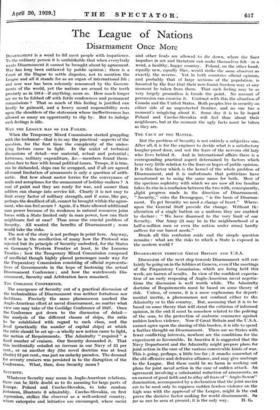DISARMAMENT THROUGH GREAT BRITAIN AND U.S.A.
Discussion of the next step towards Disarmament will cer- tainly be going on in the lobbies at Geneva, even if the meetings of the Preparatory Commission, which are being held this week, are barren of results. In view of the confident expecta- tion of an early reopening of Anglo-American naval negotia- tions the discussion is well worth while. The Admiralty doctrine of Requirements must be based on some theory of risk. Unless, of course, it is a mere euphemism for depart- mental inertia, a phenomenon not confined either to the Admiralty or to this country. But, assuming that it is to be based on some theory that will stand the criticism of informed opinion, in the end it must be somehow related to the policing of the seas, to the protection of seaborne commerce against sudden lawless violence. Now if Great Britain and the U.S.A. cannot agree upon the sharing of this burden, it is idle to spend a further thought on Disarmament. There are no States with fewer conflicting interests, nowhere are the conditions for the experiment so favourable. In America it is suggested that the Navy Department and the Admiralty might prepare plans for joint action in the case of the various conceivable kinds of war. This is going, perhaps, a little too far ; it smacks somewhat of the old offensive and defensive alliance, and may give umbrage to the League. But there could be no harm in working out plans for joint naval action in the case of sudden attack. An agreement involving a substantial reduction of armaments, as an earnest of good faith and to allay all fears of " Anglo-Saxon" domination, accompanied by a declaration that the joint navies are to be used only to suppress sudden lawless violence on the high seas with the approval of the League, might in the end prove the decisive factor making for world disarmament. So
far as can be seen at present, it Is the- only way. H. G.
























































 Previous page
Previous page